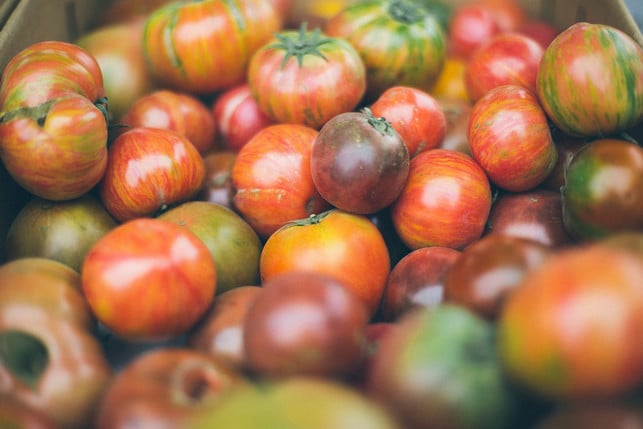Tomatoes are the most popular vegetable in Germany. But how advisable is it to eat tomatoes every day?
Although tomatoes are only in season in the summer months and taste best then, they are in demand all year round: According to Statista , in Germany we eat an average of around 27.4 kilograms of tomatoes per person each year.
Tomatoes: more than just the classic red Roma tomato
Everyone knows the classic red tomatoes: the slightly elongated Roma tomato, the round vine tomato, and the sweet little cherry tomatoes. But tomatoes come in a wide variety of sizes, shapes, and colors —tiny and round, large, fleshy and almost black, oblong and bright yellow, or green-striped. The flavors of tomatoes also range from sweet and fruity to tart and sour .
Beware of solanine or tomatine?
Unripe tomatoes are always green before they are fully ripe. At this point, however, they are very firm and taste bland, bitter, and sour—they are not recommended for consumption.
Not just because of the lack of flavor: Like all nightshades, they contain a natural defense substance from the alkaloid group called tomatine . The more familiar name for this substance in potatoes is solanine . The plant uses defense substances like tomatine and solanine to protect itself against predators and fungi.
Those who ingest large amounts of solanine may experience side effects, usually an unpleasant scratchy and burning sensation in the throat. In more severe cases, stomach upset, diarrhea, nausea and vomiting, and even impaired consciousness can occur.
However, there is little to worry about with tomatoes because tomatine is less harmful than solanine , as the Federal Center for Nutrition (bzfe ) writes:
The [tomatin] is significantly less harmful than the compounds found in potatoes. Therefore, the green stem end doesn't need to be removed for health reasons, but rather because it's tough and unpalatable. In the USA and Southern Europe, green, unripe tomatoes are often pickled, subjected to lactic acid fermentation, or processed into jam and chutney. In normal small quantities, there are no concerns about consuming such specialties.
Full of nutrients and vitamins
Tomatoes contain primarily water: around 95 percent . Therefore, they are very low in calories. They have just 21 calories per 100 grams .
By the way: Lycopene is heat-resistant and can be absorbed even better from cooked tomatoes.
Eating tomatoes every day: advantages and disadvantages
Many people in Germany and elsewhere eat tomatoes (almost) every day. And for good reason, because tomatoes have many benefits:
- You absorb many valuable nutrients.
- You consume a lot of water and few calories.
- You may have a balanced and varied diet: Tomatoes are extremely versatile; ideally, you enjoy the many different ways they can be prepared .
- You help reduce your risk of high blood pressure: A 2024 study shows that eating 110 grams of tomatoes daily can reduce the risk of high blood pressure by a third.
- You maintain your muscles: A Japanese study found that consuming tomatoes can slow age-related muscle loss. The researchers examined the handgrip strength of 259 Japanese adults over a three-year period and found that those who regularly consumed tomatoes maintained their muscle strength.
- You reduce your risk of cancer: The secondary plant substance lycopene can prevent cell changes and therefore possibly reduce the risk of cancer .

Despite the health benefits, there are also clear disadvantages that speak against eating tomatoes every day:
- You may have a one-sided diet: If eating tomatoes every day means you're constantly eating tomato sauce with pasta or hardly any other vegetables, then you're lacking variety in your diet.
- You may react to tomatoin or histamine in tomatoes: Some people do not tolerate tomatoes well and experience symptoms such as gastrointestinal problems, headaches, rapid heartbeat, or itching.
- In winter, the climate impact is poor: Although they are available year-round, tomatoes are actually only in season in summer . During the cold season, almost all tomatoes come from greenhouses, where they are grown with very high energy consumption . Furthermore, they are usually imported from abroad outside of the season, meaning they often have to travel long distances.
How many tomatoes should I eat per day?
The German Nutrition Society recommends five servings of fruit and vegetables daily . Tomatoes can be counted as one of these vegetable portions. However, variety is important. True to the motto: Eat the rainbow! Combine different types of tomatoes and other vegetables, vary the preparation methods – this way you can benefit from the full spectrum of nutrients.
When you shouldn't eat tomatoes
If you are sensitive to tomatoes, you should avoid eating them every day. For example, people who suffer from histamine intolerance generally don't tolerate tomatoes well: abdominal cramps, diarrhea, nausea, skin reddening, dizziness, headaches, rapid heartbeat, and sometimes even shortness of breath and circulatory problems typically occur immediately after eating.
If you notice such symptoms after eating tomatoes, it is better to avoid them or eat them only in very small quantities.
Eat tomatoes every day only in summer
Tomatoes are a healthy, versatile, and delicious vegetable (even though they're technically considered a fruit ). They're rich in nutrients and can be prepared both hot and cold. During the season, you can safely eat tomatoes every day. However, you should buy fewer tomatoes during the colder months : Grown in heated greenhouses and transported over long distances, they have a negative impact on the climate in winter. Furthermore, these tomatoes can't compete with summer tomatoes in terms of flavor.
More recommended for winter are other seasonal vegetables or—if you still want a tomato-based dish— canned tomatoes . Whether fresh or canned, we generally recommend buying organic tomatoes from the region whenever possible. Organic tomatoes are free of pesticides, some use open-pollinated and heirloom varieties, and organic tomatoes often taste better. Or you can grow your own tomatoes—it's not that difficult.

